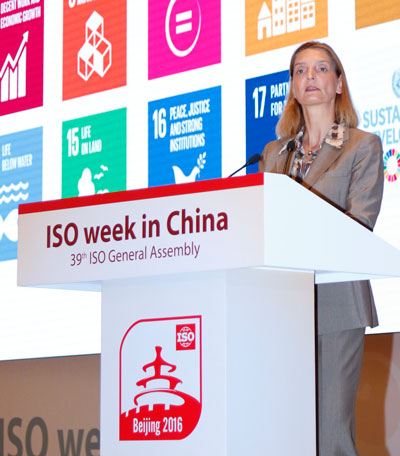The SDGs are a priority for the World Bank Group. “We are proud to have recently signed a Memorandum of Understanding (MOU) with ISO, and it’s heartening to note that ISO addresses a number of the SDGs directly.” Fruman cited ISO 26000 on social responsibility as an example of a standard contributing to sustainable development. “It is the most comprehensive guidance of what an organization should do to contribute to sustainable development. More broadly, ISO’s portfolio of more than 21 000 standards provides practical tools for all three dimensions of sustainable development: economic, environmental and societal.”

For Fruman, a number of key global trends will impact our collective capacity to meet the SDGs’ ambitious targets: demographic change; urbanization; pressure on resources; climate change; and the evolution of globalization. “All of them are likely to both shape the environment for standards and also be shaped by standards,” she said. But standards’ contribution to trade is particularly important.
According to Fruman, trade addresses all SDGs. Take, for example, SDG Goal 2 to end hunger – trade barriers have meant that only 5 % of African food staples are sourced from the continent itself, even though the potential is there to meet their own food security needs. Trade can also boost gender equality (Goal 5) through the creation of economic opportunities, and drive innovation (Goal 9).
“South-South trade is a key feature of the new international trade landscape. As evidence of this, global-value chain-related trade between developing countries has quadrupled in the last 25 years,” explained Fruman. “When I say ‘trade’, it is really shorthand for many of the issues central to the international standards agenda: not just trade of goods and services, but also investment, as well as flows of technology, ideas and people.” In Fruman’s view, standards build the confidence that underpins these different exchanges. “ISO standards have established themselves as the ‘passport’ of international trade.”
She emphasized two powerful ways in which ISO standards contribute to achieving the SDGs. First, by helping to increase developing country participation in trade – failing to do this is one of the greatest barriers to investment and outsourcing. Second, as a vessel for practical solutions to implement the SDGs.
Promoting standardization is therefore an important goal for the World Bank Group. “As we intensify our work in the area of standards, together with ISO and many of you represented here today... closer cooperation and support, especially for developing countries, will be needed to maximize the opportunities that exist.”
From the World Bank Group perspective, there are three pillars key to meeting the SDGs. Standards can contribute to all of them.
- The first is data. We need a more rigorous and systematic approach to collecting and utilizing data to make fact-based decisions, diagnose problems and monitor progress.
- The second is financing. Official development support is not enough; it needs to be complemented by a much greater focus on domestic resource mobilization. Standards can draw private investment.
- The third pillar is implementation backed by partnerships. There is a need to strengthen existing partnerships and form new ones. ISO and the World Bank Group partnership is key.
The ISO DEVCO committee brings together national member bodies from around the world to look at how international standardization can meet the needs of developing countries. Opening their 50th meeting, ISO President Dr Zhang Xiaogang drew attention to the new Action Plan for developing countries 2016-2020, which sets the strategic directions for the next five years. “This new Action Plan is ambitious. It’s visionary. Its targets are fully aligned with the Sustainable Development Goals set by the United Nations.
“This is very exciting because ISO’s future, our future, is strategically linked with that of developing countries. They make up the majority of our members. And of the world. To progress, we need them to progress.
“There are members who are struggling because of limited resources or complex national situations. They need our help the most. But we also need to support members from emerging economies. They are the ones that can make important contributions to international standardization in the short term.”
For World Bank Group’s Cecile Fruman, the benefits of international standards are:
- Support sustainable economic growth and productivity gains
- Help facilitate the adoption of good regulatory practice and create economies of scale that are particularly beneficial for small and medium enterprises
- Promote open international trade by reducing technical barriers and building confidence in the quality and safety of traded products, and increasingly also services
- Promote innovation and technology diffusion
- Level the playing field on environmental and societal issues, and codify international agreements
- Provide common ground for understanding and agreement on difficult issues, e.g. social responsibility
- Help to protect communities and consumers from unsafe and harmful products and practices

